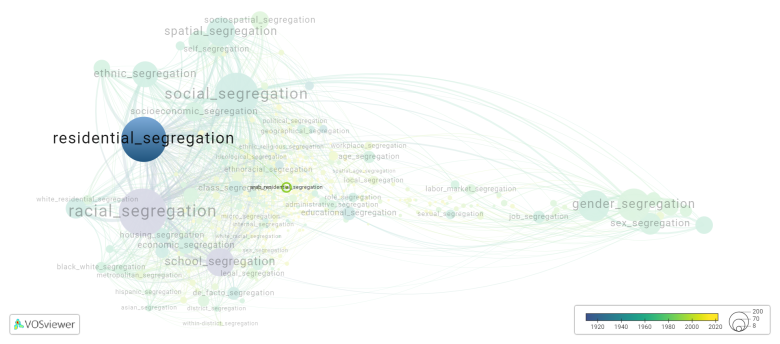Arab residential segregation: Difference between revisions
(Creating page) |
(Creating page) |
||
| (7 intermediate revisions by the same user not shown) | |||
| Line 1: | Line 1: | ||
===== Date and country of first publication<ref>Date and country of first publication as informed by the Scopus database (December 2023).</ref>===== | |||
2002<br> | 2002<br> | ||
Israel | Israel | ||
===== Definition ===== | |||
Arab residential segregation is a term used to describe the separation of Arab communities from other ethnic or religious groups within a residential area or city. This segregation may occur due to various factors, including cultural, economic, and political reasons. | Arab residential segregation is a term used to describe the separation of Arab communities from other ethnic or religious groups within a residential area or city. This segregation may occur due to various factors, including cultural, economic, and political reasons. | ||
| Line 16: | Line 16: | ||
Efforts to address Arab residential segregation typically focus on promoting integration, equal access to housing, and reducing discrimination. This may involve implementing policies that ensure fair housing opportunities for all communities and providing resources to support integration efforts. | Efforts to address Arab residential segregation typically focus on promoting integration, equal access to housing, and reducing discrimination. This may involve implementing policies that ensure fair housing opportunities for all communities and providing resources to support integration efforts. | ||
==See also== | ==See also== | ||
==Related segregation forms== | |||
Arab residential segregation is frequently discussed in the literature with the following segregation forms: | |||
[[residential segregation]] | |||
[[File:arab_residential_segregation.png|780x780px]] | |||
This visualization is based on the study [[Segregation_Wiki:About| The Multidisciplinary Landscape of Segregation Research]]. | |||
For the complete network of interrelated segregation forms, please refer to: | |||
* [https://tinyurl.com/2235lkhw First year of publication] | |||
* [https://tinyurl.com/2d8wg5n3 Louvain clusters] | |||
* [https://tinyurl.com/223udk5r Betweenness centrality] | |||
* [https://tinyurl.com/244d8unz Disciplines in which segregation forms first emerged (Scopus database).] | |||
==References== | ==References== | ||
==Notes== | ==Notes== | ||
<references /> | <references /> | ||
{{NoteAI}} | {{NoteAI}} | ||
== | ==Arab residential segregation appears in the following literature== | ||
Omer I. | Omer I., Benenson I. (2002). Investigating fine scale residential segregation by means of local spatial statistics. ''Geography Research Forum'', ''22''(), 41-60. https://doi.org/ | ||
Latest revision as of 07:17, 16 October 2024
Date and country of first publication[1][edit | edit source]
2002
Israel
Definition[edit | edit source]
Arab residential segregation is a term used to describe the separation of Arab communities from other ethnic or religious groups within a residential area or city. This segregation may occur due to various factors, including cultural, economic, and political reasons.
In some cases, Arab residential segregation may result from a desire to live among people who share similar cultural practices, language, or religious beliefs. This is often seen as a way for Arab communities to maintain their cultural identity and traditions, as well as to provide support networks and services specific to their needs.
Economic factors can also contribute to residential segregation, as Arab communities may be concentrated in certain areas due to affordable housing options or proximity to job opportunities. This can lead to the creation of ethnic enclaves or neighborhoods where Arab residents dominate the population.
Political factors, such as discriminatory policies, can also contribute to Arab residential segregation. In some instances, Arab communities may face systemic barriers and inequalities that limit their access to housing, leading to concentration in specific areas.
While residential segregation can have positive aspects in terms of cultural preservation and community building, it can also perpetuate social divisions and hinder integration. Some argue that residential segregation can lead to socio-economic disparities, limited exposure to different cultural perspectives, and increased tensions between different ethnic or religious groups.
Efforts to address Arab residential segregation typically focus on promoting integration, equal access to housing, and reducing discrimination. This may involve implementing policies that ensure fair housing opportunities for all communities and providing resources to support integration efforts.
See also[edit | edit source]
Related segregation forms[edit | edit source]
Arab residential segregation is frequently discussed in the literature with the following segregation forms:
This visualization is based on the study The Multidisciplinary Landscape of Segregation Research.
For the complete network of interrelated segregation forms, please refer to:
References[edit | edit source]
Notes[edit | edit source]
- ↑ Date and country of first publication as informed by the Scopus database (December 2023).
At its current state, this definition has been generated by a Large Language Model (LLM) so far without review by an independent researcher or a member of the curating team of segregation experts that keep the Segregation Wiki online. While we strive for accuracy, we cannot guarantee its reliability, completeness and timeliness. Please use this content with caution and verify information as needed. Also, feel free to improve on the definition as you see fit, including the use of references and other informational resources. We value your input in enhancing the quality and accuracy of the definitions of segregation forms collectively offered in the Segregation Wiki ©.
Arab residential segregation appears in the following literature[edit | edit source]
Omer I., Benenson I. (2002). Investigating fine scale residential segregation by means of local spatial statistics. Geography Research Forum, 22(), 41-60. https://doi.org/

